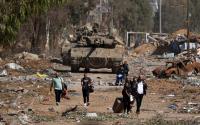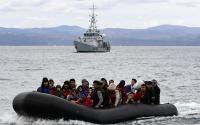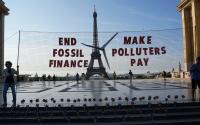27 May 2008Mahir Ali
ON his road to Palais de l'Élysée, Nicolas Sarkozy proclaimed, among other things, that he was out to obliterate the legacy of 1968. "The heirs of May '68," he said, "imposed the idea that there was no longer any difference between good and evil, truth and falsehood, beauty and ugliness." By attacking the prevailing ethical standards, the 68ers, according to him, helped to "weaken the morality of capitalism, to prepare the ground for the unscrupulous capitalism of golden parachutes for rogue bosses".
His inability to grasp the essence of that year's tumultuous events did little to impede his ascent to the presidency, but some of his supporters proved unwilling to let him get away with his misinterpretation. André Glucksmann, who looks upon Sarkozy as the person best equipped to modernize "the gilded museum of France", describes him as "the first post-'68 president", adding: "To liquidate '68 is to liquidate himself." Another '68 veteran, Alain Geismar, contends: "As a divorced man, Sarkozy couldn't have been invited to dinner at the Élysée Palace, let alone be elected president of France", not least on account of his Jewish and foreign roots.
Views of this nature tend to challenge the orthodox opinion that 1968, on every front, was an unmitigated failure in France and elsewhere, an aberration, a monumental folly that inevitably led to chiefly negative repercussions. Yet the facts belie this negative interpretation.
Forty years ago this week, when Charles de Gaulle left the Élysée Palace but did not turn up at his country residence, it was briefly assumed that he had fled. It turned out that he had - but only as far as a French base in West Germany, where he struck a deal with the extreme right-wing General Jacques Massu to the effect that, if necessary, the French armed forces would defend Paris against the rabble. The quid pro quo was that de Gaulle would free several of the fascist figureheads who had been detained for violently resisting the Fifth Republic's decision to end France's brutal occupation of Algeria.
De Gaulle kept his part of the bargain, but a military coup never proved necessary, thanks in large part to the conservative instincts of the French Communist Party (PCF), which had little sympathy for the Trotskyites and Maoists who had spearheaded the student uprising.
The revolt had erupted a few months earlier at Nanterre over a relatively mundane matter: the strictly enforced segregation between male and female dormitories. Within weeks the refusal to take no for an answer had been mirrored at other universities. Segregation of the sexes served only momentarily as the dominant issue: before long, the overthrow of the established order became the main, albeit somewhat nebulous, goal. What would replace it never crystallized into a clear-cut objective.
The students were aware that their dreams never stood a chance without working-class support, which they assiduously courted, and not without success. At one point, nearly two-thirds of French workers went on strike, and many of the younger ones among them were openly sympathetic to the prospect of regime change: when the PCF and the country's main Communist-controlled union, the CGT, won considerably improved conditions and a substantial wage hike in negotiations with the government of Giscard d'Estaing, the rank and file initially rejected the deal. The idea of overthrowing capitalism clearly resonated with younger workers in particular.
But it was not to be. Although the students had initially garnered a great deal of outside support, the traditional left and right ultimately proved impenetrable. However, although the conservatives easily won elections the following year, the dictatorial de Gaulle also bowed out before the decade was through.
A comparable scenario unfolded in Pakistan, beginning in November that year. Coincidentally or otherwise, earlier in the decade Field Marshal Ayuib Khan had been hailed by his sponsors in Washington as the Asian de Gaulle. By the following year he was out of the picture, albeit - unlike de Gaulle and US president Lyndon B. Johnson - on account of a military coup. The consequences included Pakistan's first general election and, after the Yahya junta refused to abide by its results (with more than a little help from Zulfikar Ali Bhutto), the end of a lopsided and illogical federation.
The US, meanwhile, had gone up in flames following the assassination of Martin Luther King Jr on April 4, and the trauma was compounded when Democratic presidential hopeful Robert F. Kennedy was shot dead right after winning the crucial California primary in June. When Hillary Clinton last week cited this tragedy as a reason for not bowing out of the race just yet, the implication that her rival could succumb to a similar fate was not lost on many. However, arguably the most crucial events of '68 in the US occurred on the streets of Chicago during the Democratic convention in that city, authorized by Mayor Daley, when armed representatives of the state unloosed an orgy of violence against anti-war demonstrators.
Forty years on, Chicago again has a mayor called Daley - the son of the original - who has, somewhat ironically, endorsed Barack Obama, the closest thing this year to an anti-war candidate. In a sense, Obama and Clinton are legatees of '68, which was something of a watershed in terms of race and gender equality - although aspirations on both grounds are yet to be completely fulfilled.
Among the less well-remembered uprisings that year was the unrest in Mexico, where more than 300 students and supporters demonstrating against the stultifying rule of the Institutional Revolutionary Party were massacred in Tlateloco Square shortly before the Olympics in Mexico City. The fate of many who went missing that day remains undetermined four decades later: it has long been rumoured, though, that the corpses were dumped in the sea.
Transgressions on this scale did not take place in Czechoslovakia, where Warsaw Pact tanks almost literally crushed an experiment aimed at establishing "socialism with a human face". Alexander Dubcek and his comrades wished to introduce a degree of democracy and free speech into the East European paradigm, but Leonid Brezhnev and his cohorts abhorred such liberties. Twenty-one years later, "communism" in Czechoslovakia and elsewhere was vanquished anyhow, and the graphic artists of 1989 realised they only need to turn the latter two digits of 1968 upside down to establish the connection.
There are various other ways in which the legacy of '68 lives on. The Vietnam War - which, particularly in the wake of the Tet offensive earlier that year - was a focal point for rebellions not just in the US but across the world, alongside the martyrdom of Che Guevara the previous year. His was the face that launched a thousand revolts. All that the protesters were saying was give peace a chance. And that another world is possible.
They are still saying it. But now they know that the Vietnam War eventually ended in a triumph for anti-imperialist forces. And that the visage of Che gazes upon all who enter the presidential palace in Boilivia.
Email: [email protected]
http://www.zmag.org/znet/viewArticle/17747






